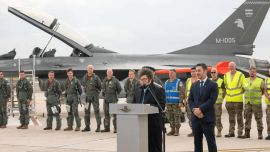Argentina has revealed the identity of a top Hezbollah operative in Latin America, alleging the individual is responsible for two of the nation’s most deadly terror attacks.
Last Friday, Security Minister Patricia Bullrich named Hussein Ahmad Karaki as the terrorist organisation’s operational chief in the region, alleging he was directly responsible for "the attacks on the Israeli Embassy and the AMIA” Jewish community centre in 1992 and 1994 respectively.
Karaki is accused of being directly responsible for the purchase of the car used to blow up the Israeli Embassy in 1992, she said.
“It’s no longer a ghost name, it’s Hussein Ahmad Karaki, also known under his aliases of ‘Abu Ali,’ ‘Rami’ and ‘Saad Az Aldin,’ said the minister.
The Security Ministry also accused the alleged operative of being behind the recruitment for and planning of the 1994 attack on the Jewish community centre.
In addition, throughout this century, "he has been a point of convergence for recruiting organised crime members or ex-cons for the frustrated Trapiche I and II attacks in Brazil, as well as in Colombia, Bolivia and Peru, among other terrorist actions," it added.
At a press conference Bullrich pointed out that it could be determined that Karaki entered Argentina early in 1992, just two months before the Israeli Embassy attack.
He had also been in Argentina, Brazil and Paraguay between 1990 and 1991, recruiting José Suleiman in São Paulo for the contraband of explosives and entering this country with a Colombian passport under the name of Alberto León Naím.
"This gentleman purchased and prepared the van which blew up the Israeli Embassy,” said Bullrich.
“Today we have come to supply the name of Hezbollah’s Latin American chief who bought the car-bomb under the name of Elías Ribeiro Dalush with a fake Brazilian Passport No. 34 031 567 and who, a few hours before the attack, left Jorge Newbery Airport heading for the Iguazú waterfalls,” detailed the Security minister.
She then explained that Karaki "disappeared under the radar" and went undetected by the Western intelligence services for several years after the attacks on the Israeli Embassy and the AMIA.
Furthermore, she pointed out that Bolivia came close to having a building blown up with a car-bomb similar to that used in the AMIA attack, which killed 85 people and injured almost 300.
"In Peru last March and November, where Argentina collaborated, there were two Brazilian Federal Police operations known as Trapiche 1 and Trapiche II," said Bullrich.
"Operation Trapiche dismantled an organisation linked to Hezbollah which had recruited Brazilian citizens to perpetrate attacks against Jewish community installations in Brazil. There were 22 arrests.
“In Operation Trapiche II they tried to murder a businessman, generating a series of ramifications for money-laundering via travel agencies and bureaux de change," she told reporters.
“We want the Argentine people to know that Karaki was behind the attacks on the Israeli Embassy and the AMIA, buying the car-bomb and acting as the operational chief in direct line with the late [Hezbollah secretary-general] Hassan Nasrallah,” manifested Bullrich, who said the breakthrough came after joint work from the SIDE intelligence service and staff at her portfolio.
She further anticipated that she would be sending a letter to the Lebanese Embassy requesting collaboration to clarify the attacks and prevent new ones.
The Attorney-General’s Office will be asked to explore the means of nailing Karaki’s international arrest via an Interpol Red Notice in order to be able to try him in absentia.
Argentina is part of the investigation in the framework of international cooperation, working with those countries which have already initiated judicial proceedings.
Karaki is wanted for the deadliest terrorist attack in Argentina’s history. On 18 July 1994, a truck drove into the AMIA Jewish community centre, laden with explosives. Besides the 85 dead, more than 300 people were injured.
The 1994 assault has never been claimed or solved, but Argentina and Israel have long suspected that Lebanon's Shiite Hezbollah group carried it out at Iran's request.
In April, an Argentine court blamed Hezbollah for the attack it called a "crime against humanity," and labelled Iran a "terrorist state."
It found that the attack and another on the Israeli Embassy in 1992 which killed 29 people, were likely triggered by the government under then-president Carlos Menem cancelling three contracts concluded with Iran for the supply of nuclear equipment and technology.
After that ruling, Buenos Aires asked Interpol to arrest Iran's Interior Minister Ahmad Vahidi, whom it accuses of masterminding the attack, but Tehran denies any involvement.
In 2015, an investigation by a special AMIA investigative unit began to review the initial judicial process. That ended in 2019 with the determination that the state had been involved in a “cover-up,” resulting in light sentences for court officers and Menem government officials. It did not identify the reasons why.
The cover-up consisted of paying the alleged seller of the van used in the bombing, Carlos Telleldín, some US$400,000 to accuse a group of police officers of being part of the local connection.
Early in 2015, a special prosecutor appointed to probe the AMIA bombing, Alberto Nisman, accused former president Cristina Fernández de Kirchner (2007-15) of orchestrating another cover-up in exchange for oil and trade benefits.
Four days later he was found dead under mysterious circumstances as he was about to present his findings before Congress.
Fernández de Kirchner’s controversial Memorandum of Understanding, which would have seen Iranian officials questioned about the bombing, never entered into force.
Argentina’s justice system dropped its obstruction probe against Fernández de Kirchner in 2021 but reopened it last year.
Menem was tried for a cover-up in the case, but acquitted. He died in 2021.
The day before Bullrich’s press conference, the Inter-American Court of Human Rights ordered Argentina to remove all obstacles "which maintain total impunity in this case."
The state has not allowed access to information gathered about the event and the intelligence agencies have classified the files as "secret.”
The state should do everything necessary "to identify, judge and punish those responsible for the events of this case, their cover-up and, thus, be able to establish the truth of what happened, all within a reasonable time," the court ruled.
Argentina has the largest Jewish community in Latin America, with some 300,000 members.
– TIMES/AFP/NA


























Comments